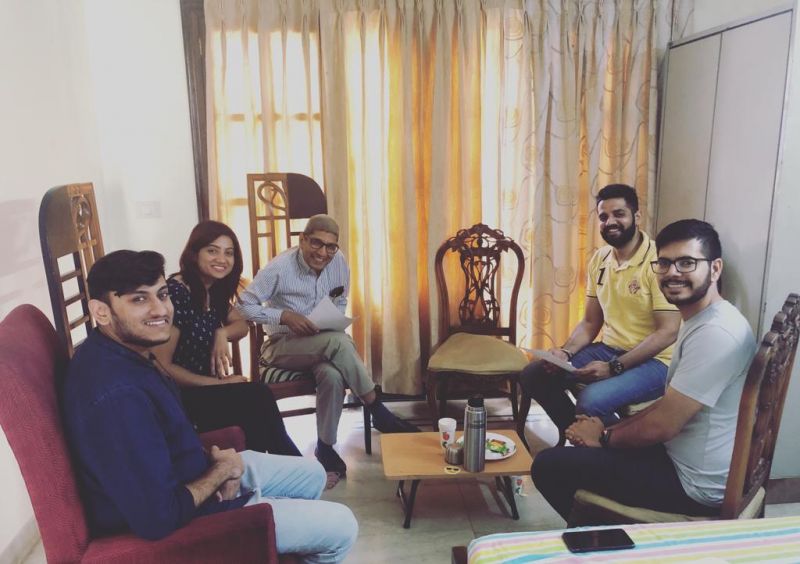Experiences From Love Heals Cancer’s Healing
Experiences from Love Heals Cancer’s Healing Circle of Caregivers in Gurugram, India:
Healing circles are safe havens that help us step out of ordinary time into a safe and accepting environment in which we can explore our healing.
With open minds, we work together to discover the best ways to remove obstacles to healing, alleviate suffering, and deepen our capacity to heal. With open hearts, we access our own inner guidance to understand where the greatest healing — in body, emotions, mind, and spirit — can occur. Read more about Healing Circles on the website — https://lovehealscancer.org/about-healing-circles

Participants — Aviral, Dimple, Shyam, Rahul, Gautam(Left to Right)
The theme of the circle was around the caregiving experiences of the participants and the challenges they faced during their journey.
Ripples of the Circle:
The group decided to talk piece to be a printed emoji sticker(😎) with a message “Be Happy Now” signifying a confident, cool and smiling attitude of the speaker. This sticker was given to me by Christopher (Krishna) from Gandhi Ashram :)
We also talked about what brought them to the healing circle. Everyone was connected by some form of suffering or challenge they encountered, which transformed their views towards life.
After the introductions, I asked to share the caregiving experience of the participants and what specific challenges they faced during the process.
We felt healed:
Aviral stated that he is quite fueled by the conversations today and felt that together as a group he can do a lot more towards contributing to society. He spoke about organizing a youth circle at his place soon.
Shyam said around the importance of supporting circles and how they help. When a group of like-minded people meets, they talk through their heads but their hearts get connected in the process. He spoke about the theory of vulnerability. At times people are not usually open about their experiences but when they find someone who has been through something similar they become very comfortable sharing their thoughts.
Rahul felt great attending the Healing Circle. Having been a caregiver he mentioned that he craved for a place to go to and speak his heart out since long. He wished to support similar people in their journey through cancer.
I spoke about how this meeting helped in her own healing and understanding what challenges patients and caregivers face. I discussed how LHC is planning on solving all the challenges highlighted in the meeting.
Sharing by Participants:
Need quality information:
There are hundreds of different treatments available which go beyond allopathy and help in some of the other ways but that information is very scattered and a decision is hard to take because no one can go for all. It is very important to put all of them at a place and take an informed decision about the choices in healing.
Better counseling approach:
There was a common opinion of everyone around the less empathetic attitude of some medical practitioners with respect to counseling. During the caregiving journey, everyone has at least once experienced a traumatizing statement like “Go home, you are wasting your time…the patient is going to die in a month anyway and we cannot do anything.”
In a way, they are being honest and correct. However, a counselor should also empathetic towards the patients and caregivers. While it is important to highlight the true fact, a good counselor would mold the answer in a way that inspires the best use of whatever time a patient nearing end-of-life has.
Need Support Groups:
Shyam highlighted the fact that during his journey he got to know a lot about colon cancer and the various treatments available. He wants to share all the information which he gained over 4 years and which would be helpful for someone who has just been diagnosed with colon cancer.
Cancer-Specific Support Groups are need of the hour where patients and caregivers can meet and pass their experience to one another.
A Fear or Taboo around Death:
Rahul and Shyam highlighted that idea of discussing death never comes to anyone’s mind. Neither the patient or caregiver initiates this discussion. It could be because of fear or not being open to accepting the fact that the patient is dying. It is very important to discuss death and avoid the fear around it.
Dying is something that happens to all of us. It is a part of life, it can be sad and messy and powerful and hard and normal and absurd and everything in between. But, there must be a discussion of what’s next? How will things change after death? How would you want to expect things after death?
Posted by Dimple Parmar on Apr 22, 2019



On Apr 26, 2019 Shyam wrote:
Post Your Reply